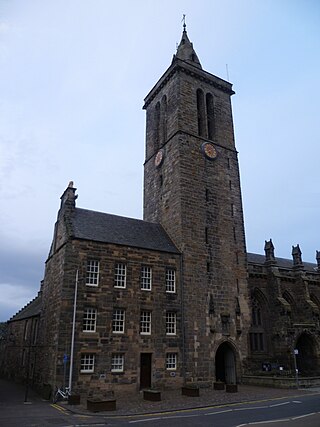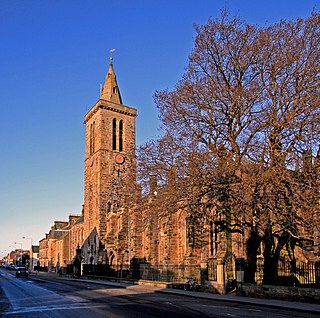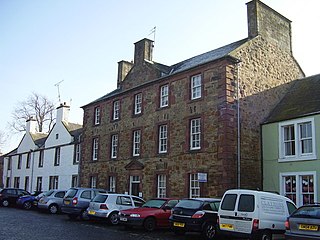Related Research Articles

The Scottish Enlightenment was the period in 18th- and early-19th-century Scotland characterised by an outpouring of intellectual and scientific accomplishments. By the eighteenth century, Scotland had a network of parish schools in the Scottish Lowlands and five universities. The Enlightenment culture was based on close readings of new books, and intense discussions which took place daily at such intellectual gathering places in Edinburgh as The Select Society and, later, The Poker Club, as well as within Scotland's ancient universities.

Dugald Stewart was a Scottish philosopher and mathematician. Today regarded as one of the most important figures of the later Scottish Enlightenment, he was renowned as a populariser of the work of Francis Hutcheson and of Adam Smith. Trained in mathematics, medicine and philosophy, his lectures at the University of Edinburgh were widely disseminated by his many influential students. In 1783 he was a joint founder of the Royal Society of Edinburgh. In most contemporary documents he is referred to as Prof Dougal Stewart.

Alexander Campbell Fraser was a Scottish theologian and philosopher.
The culture of Scotland refers to the patterns of human activity and symbolism associated with Scotland and the Scottish people. The Scottish flag is blue with a white saltire, and represents the cross of Saint Andrew.

James Dalrymple, 1st Viscount Stair was a Scottish lawyer and statesman, and a key influence on the Scottish Enlightenment. He was a leading figure of Scottish law, "and also one of the greatest thinkers on law across Europe has ever produced".

Ramism was a collection of theories on rhetoric, logic, and pedagogy based on the teachings of Petrus Ramus, a French academic, philosopher, and Huguenot convert, who was murdered during the St. Bartholomew's Day massacre in August 1572.

John Major was a Scottish philosopher, theologian, and historian who was much admired in his day and was an acknowledged influence on all the great thinkers of the time. A renowned teacher, his works were much collected and frequently republished across Europe. His "sane conservatism" and his sceptical, logical approach to the study of texts such as Aristotle or the Bible were less prized in the subsequent age of humanism, when a more committed and linguistic/literary approach prevailed.
Rev George Jardine FRSE was a Scottish minister of religion, philosopher, academic and educator. He was Professor at the University of Glasgow, of Greek from 1774, and then Professor of Logic and Rhetoric 1787 to 1824. He was a co-founder of the Royal Society of Edinburgh in 1783 and co-founder of Glasgow Royal Infirmary in 1792.

The history of education in Scotland in its modern sense of organised and institutional learning, began in the Middle Ages, when Church choir schools and grammar schools began educating boys. By the end of the 15th century schools were also being organised for girls and universities were founded at St Andrews, Glasgow and Aberdeen. Education was encouraged by the Education Act 1496, which made it compulsory for the sons of barons and freeholders of substance to attend the grammar schools, which in turn helped increase literacy among the upper classes.

George Elder Davie was a prominent Scottish philosopher whose well-received book, The Democratic Intellect (1961), concerns the treatment of philosophy in 19th century Scottish universities.

The Renaissance in Scotland was a cultural, intellectual and artistic movement in Scotland, from the late fifteenth century to the beginning of the seventeenth century. It is associated with the pan-European Renaissance that is usually regarded as beginning in Italy in the late fourteenth century and reaching northern Europe as a Northern Renaissance in the fifteenth century. It involved an attempt to revive the principles of the classical era, including humanism, a spirit of scholarly enquiry, scepticism, and concepts of balance and proportion. Since the twentieth century, the uniqueness and unity of the Renaissance has been challenged by historians, but significant changes in Scotland can be seen to have taken place in education, intellectual life, literature, art, architecture, music, science and politics.
Conjectural history is a type of historiography isolated in the 1790s by Dugald Stewart, who termed it "theoretical or conjectural history," as prevalent in the historians and early social scientists of the Scottish Enlightenment. As Stewart saw it, such history makes space for speculation about causes of events, by postulating natural causes that could have had such an effect. His concept was to be identified closely with the French terminology histoire raisonnée, and the usage of "natural history" by David Hume in his work The Natural History of Religion. It was related to "philosophical history", a broader-based kind of historical theorising, but concentrated on the early history of man in a type of rational reconstruction that had little contact with evidence.

Education in early modern Scotland includes all forms of education within the modern borders of Scotland, between the end of the Middle Ages in the late fifteenth century and the beginnings of the Enlightenment in the mid-eighteenth century. By the sixteenth century such formal educational institutions as grammar schools, petty schools and sewing schools for girls were established in Scotland, while children of the nobility often studied under private tutors. Scotland had three universities, but the curriculum was limited and Scottish scholars had to go abroad to gain second degrees. These contacts were one of the most important ways in which the new ideas of Humanism were brought into Scottish intellectual life. Humanist concern with education and Latin culminated in the Education Act 1496.
The Rankenian Club was an 18th-century society of intellectuals, founded in 1716 or earlier and disbanded some time after 1760.

Education in Medieval Scotland includes all forms of education within the modern borders of Scotland, between the departure of the Romans from Britain in the fifth century, until the establishment of the Renaissance late fifteenth century and early sixteenth century. Few sources on Scottish education survived the Medieval era. In the early Middle Ages, Scotland was an oral society, with verbal rather than literary education. Though there are indications of a Gaelic education system similar to that of Ireland, few details are known. The establishment of Christianity from the sixth century brought Latin to Scotland as a scholarly and written language. Monasteries served as major repositories of knowledge and education, often running schools.

Scottish common sense realism, also known as the Scottish school of common sense, is a realist school of philosophy that originated in the ideas of Scottish philosophers Thomas Reid, Adam Ferguson, James Beattie, and Dugald Stewart during the 18th-century Scottish Enlightenment. Reid emphasized man's innate ability to perceive common ideas and that this process is inherent in and interdependent with judgement. Common sense, therefore, is the foundation of philosophical inquiry. Though best remembered for its opposition to the pervasive philosophy of David Hume, Scottish common sense philosophy is influential and evident in the works of Thomas Jefferson and late 18th-century American politics.

The history of universities in Scotland includes the development of all universities and university colleges in Scotland, between their foundation between the fifteenth century and the present day. Until the fifteenth century, those Scots who wished to attend university had to travel to England, or to the Continent. This situation was transformed by the founding of St John's College, St Andrews in 1418 by Henry Wardlaw, bishop of St. Andrews. St Salvator's College was added to St. Andrews in 1450. The other great bishoprics followed, with the University of Glasgow being founded in 1451 and King's College, Aberdeen in 1495. Initially, these institutions were designed for the training of clerics, but they would increasingly be used by laymen. International contacts helped integrate Scotland into a wider European scholarly world and would be one of the most important ways in which the new ideas of humanism were brought into Scottish intellectual life in the sixteenth century.

Scottish education in the eighteenth century concerns all forms of education, including schools, universities and informal instruction, in Scotland in the eighteenth century.

Scottish philosophy is a philosophical tradition created by philosophers belonging to Scottish universities. Although many philosophers such as Francis Hutcheson, David Hume, Thomas Reid, and Adam Smith are familiar to almost all philosophers it was not until the 19th century that the notion of 'Scottish philosophy' became recognized and highly regarded internationally. In the 20th century, however, this tradition declined as Scottish-educated philosophers left for England.
David Cranston or Cranstoun was a Scottish scholastic philosopher and theologian in the circle of John Mair.
References
- ↑ "Alexander Broadie, 1942 -, Professor of Logic and Rhetoric, University of Glasgow". Archived from the original on 15 August 2010. Retrieved 2 January 2011.